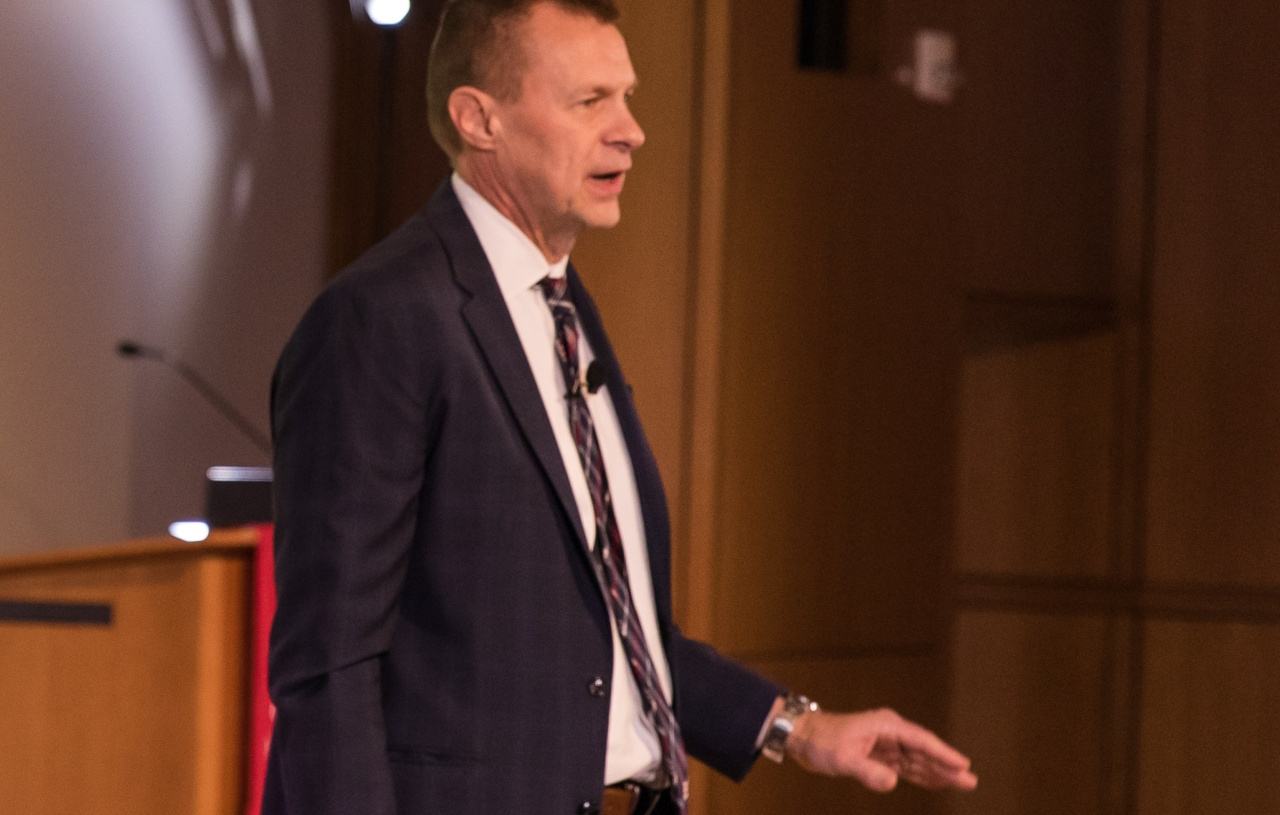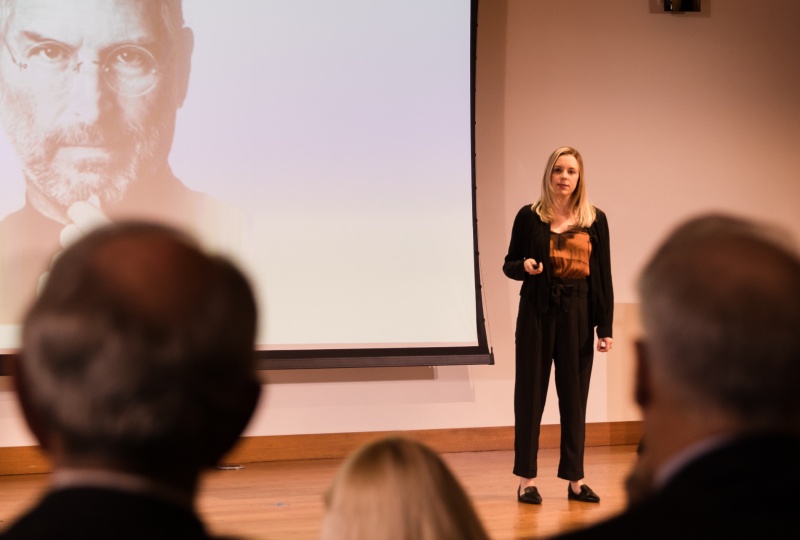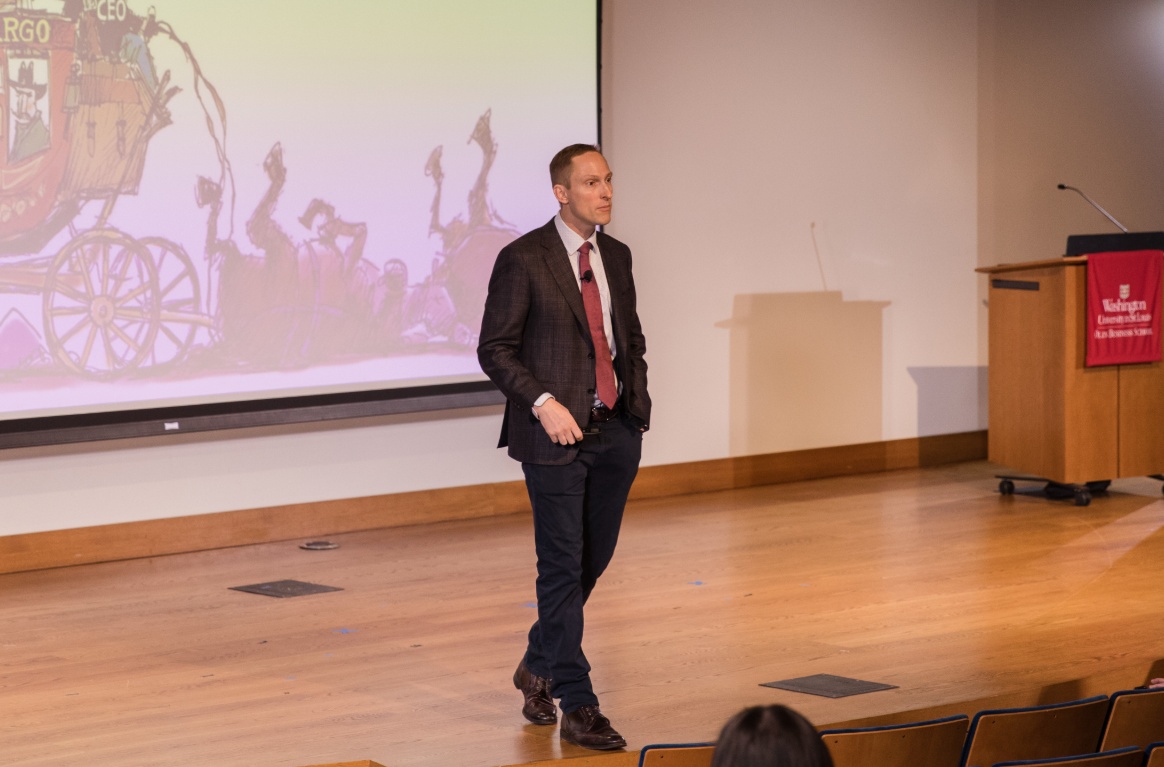Three talks: Applying research to the importance of character
- February 28, 2020
- By Kurt Greenbaum
- 4 minute read

Trust actually has economic value. Narcissists aren’t the leaders they think they are. Organizational leaders need to be realistic about the balance between driving productivity and incentivizing good behavior.
These were among the takeaways from a 75-minute Century Club program on leadership, summarized in a series of three TED-style talks by WashU Olin faculty members on February 26. The professors summarized their research under the umbrella “The Importance of Character for Leadership.”
Kurt Dirks, Bank of America Professor of Leadership, presented on whether trust had more than simply moral value for organizational leaders. Emily Grijalva, assistant professor of organizational behavior, outlined the state of research in her specialty—narcissism. And Lamar Pierce, professor of organization and strategy, focused on organizing incentives around character in the workplace.
Kurt Dirks
When he cofounded the Bauer Leadership Center at Olin, one of the questions he hoped to address was whether “we could think about character as something that doesn’t just have moral value, but whether it has economic value.”
Dirks, who also serves as vice chancellor of international affairs for Washington University, explained to the audience that trust is an outgrowth of having good moral character. He was musing about how to quantify the effect of trust on performance while watching college basketball—and it occurred to him that might be a laboratory to test the question.
“Is there something about coaches and their ability to create trust?” Dirks wondered? As it turns out, there was. “The effect of trust was just below the effect of talent on the ability to win.”
So, through the research, Dirks concluded that trust not only feels good and serves as a moral attribute but also produces results.
The next question: Why is creating trust so difficult? Dirks outlined three elements in the chemistry of trust: character, competence and caring.
“Trust is something that has social good as well as instrumental good,” he said. “It may be harder to create than most of us realize.”
Emily Grijalva
Grijalva confessed that “I started to get nervous when a journalist asked me for tips about how a person could cultivate their narcissism.” That was based on the popular misconception that narcissists make bold, charismatic leaders.
As an expert in the field, however, she has surveyed the research on narcissism thoroughly and produced original research. Her conclusion: Not every narcissistic leader is destined to enjoy the success of her favorite example, Steve Jobs.
“He’s a great example of the many aspects of what it means to have this trait,” she said, because he embodies both the positive and negative attributes. They match our conception of the prototypical leader: They’re dominant, self-confident, charismatic, inspiring and persuasive.
On the other hand, they also tend to be overly grandiose, entitled, exploitative and arrogant. Bottom line, she said, studies are inconsistent about whether narcissism creates positive or negative leaders. But in her review of 42 studies, narcissistic people tend to emerge as leaders, but that trait doesn’t necessarily make them effective leaders.
“Narcissism is best in moderation,” she said. So should you cultivate your narcissism? “If you value character, my answer would be no. I recommend you develop your humility.”
Lamar Pierce
Growing up, Pierce—who is also associate dean for the Olin-Brookings Partnership—”couldn’t understand why other people couldn’t follow the rules, why they couldn’t achieve. It continued to be a mystery to me.”
When he became ill with lymphoma at 26, went through treatment and emerged, he felt like his life had changed. He was a graduate student, but he was angry, narcissistic, arrogant.
What I realized that the myth I grew up with, it was not true. The world was not about people with character and people without character.
Lamar Pierce
He started to think about the world as a crucible and started to study misconduct. “I really started to do some stupid stuff. I started asking why am I doing these things?”
Over the years, he’s come to realize that “life is a series of decisions that we make”—decisions made without full information, decisions made with biased information, decisions made with emotion.
His research also led to the conclusion that everyone has to make an honest assessment of who they are and what their character is. But mostly, his research has led to conclusions about how to balance incentives that drive productivity with incentives that promote good behavior. Too often, organizational leaders incentivize performance—and then they’re surprised when bad behavior emerges among employees who cheat on their way to hitting their marks.
Alternatively, leaders who don’t think carefully about how they incentivize good behavior—a zero-tolerance policy for theft, for example—may find their employees hate them. Draconian measures can drive low morale.
“We care about performance and productivity, but we also care about how we get there,” Pierce said, recommending that leaders draw a line in the sand on the behavioral issues they really care about—sexual harassment, for example. “You have to have that conversation up front or you’ll find ways to equivocate and make excuses when people cross that line.”
Pictured above: Kurt Dirks presenting to the gathering of the Century Club, February 26, 2020.
The Importance of Character for Leadership
Applying research to the importance of character


Media inquiries
For assistance with media inquiries and to find faculty experts, please contact Washington University Marketing & Communications.
Monday–Friday, 8:30 to 5 p.m.
Sara Savat
Senior News Director, Business and Social Sciences
